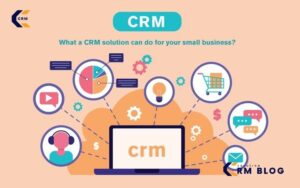CRM – Customer Relationship Management (CRM) in healthcare has become a vital tool for improving patient care and streamlining operations. As healthcare providers seek better ways to manage relationships with patients, CRM systems help by centralizing data, enhancing communication, and improving patient satisfaction.
In this article, we will explore what CRM in healthcare is, its benefits, and which CRM solutions are best suited for the healthcare industry. Whether you’re a healthcare provider or administrator, this guide will show you how a CRM can transform your patient management practices.
Table of Contents:
What is CRM in Healthcare?
CRM in healthcare refers to the use of a system designed to manage and improve the relationship between healthcare providers and their patients. It centralizes data from various departments, including patient history, appointments, billing, and communication, into one platform. Healthcare CRMs aim to improve patient engagement, communication, and overall care quality by providing a 360-degree view of each patient.
Healthcare providers use CRM systems to automate routine tasks, monitor patient interactions, and ensure that follow-ups are handled promptly. This enables more personalized patient care and enhances operational efficiency.
Benefits of CRM in Healthcare
CRM in healthcare brings numerous advantages that enhance patient care and streamline healthcare operations. Let’s explore the key benefits of CRM in healthcare and how it impacts the overall healthcare system.
1. Enhanced Patient Engagement
CRM systems in healthcare provide tools that improve patient communication and engagement. By automating appointment reminders, follow-ups, and personalized messages, healthcare providers can keep patients informed and involved in their care plans.
This consistent interaction leads to higher patient satisfaction and retention rates, fostering a stronger provider-patient relationship.
The Benefits of CRM NetSuite for Your Business

2. Streamlined Administrative Operations
One of the primary benefits of CRM in healthcare is its ability to streamline administrative processes. Automating routine tasks such as appointment scheduling, billing, and communication management reduces the burden on healthcare staff.
This allows more time for patient-focused activities, improving efficiency and care delivery across the organization.
3. Improved Data Management and Access
CRM systems centralize patient data, providing healthcare providers with a comprehensive view of each patient’s medical history, preferences, and interactions.
This organized data access reduces the risk of errors, ensures continuity of care, and empowers healthcare teams to make informed decisions quickly, leading to better treatment outcomes.
4. Personalized Patient Care
By utilizing CRM in healthcare, providers can deliver more personalized care. CRMs collect and analyze patient data to tailor treatment plans, medical recommendations, and follow-ups based on each patient’s individual needs. This personalized approach enhances the quality of care, improving patient outcomes and satisfaction.
5. Better Coordination Between Departments
Another significant benefit of CRM in healthcare is its ability to improve communication and collaboration between different departments. With all relevant patient data stored in a centralized system, departments such as billing, medical staff, and administration can access and share critical information seamlessly. This reduces miscommunication, speeds up processes, and ensures a more unified approach to patient care.
Top CRM Recommendations for Healthcare
Choosing the right CRM for healthcare can significantly impact patient care and operational efficiency. Below are some top CRM solutions tailored for healthcare providers, each offering unique features that cater to the industry’s specific needs.
1. Salesforce Health Cloud
Salesforce Health Cloud is one of the most popular CRM systems designed specifically for the healthcare sector. This powerful platform integrates patient data, clinical information, and communication tools, allowing healthcare providers to offer more personalized care.
Top Benefits and Tips for Choosing a CRM Developer

Salesforce Health Cloud helps organizations track patient interactions across various touchpoints, ensuring a seamless patient experience. Additionally, it allows for real-time collaboration among healthcare teams, improving decision-making and patient outcomes.
2. HubSpot CRM
While HubSpot CRM is not exclusive to healthcare, its customizable features make it a great option for healthcare organizations looking to improve patient engagement and streamline workflows.
HubSpot offers tools for tracking patient communication, managing appointments, and automating follow-ups. The platform’s user-friendly interface and marketing automation capabilities also make it easy for healthcare providers to create personalized communication strategies, helping to build stronger patient relationships.
3. Zoho CRM for Healthcare
Zoho CRM provides a tailored solution for healthcare providers that includes features like patient management, appointment scheduling, and automated reminders.
The system is designed to help healthcare professionals manage large volumes of patient data efficiently while maintaining a high level of personalization in care delivery. Zoho CRM also integrates with other healthcare systems, ensuring that patient information is always up-to-date and easily accessible across departments.
Each of these CRM systems brings unique features and benefits to healthcare providers, helping them improve patient engagement, streamline operations, and deliver personalized care. The key is to choose a CRM that fits the specific needs of your organization and can adapt to the dynamic nature of healthcare environments.
FAQs
Conclusion
Incorporating a CRM system in healthcare can significantly enhance patient care and operational efficiency. By centralizing data, streamlining communication, and automating administrative tasks, healthcare providers can focus more on delivering personalized and high-quality care.
Selecting the right CRM for your organization is crucial to unlocking these benefits and ensuring a smoother healthcare experience for both patients and providers.
Enhancing User Experience with Effective CRM UI Design


